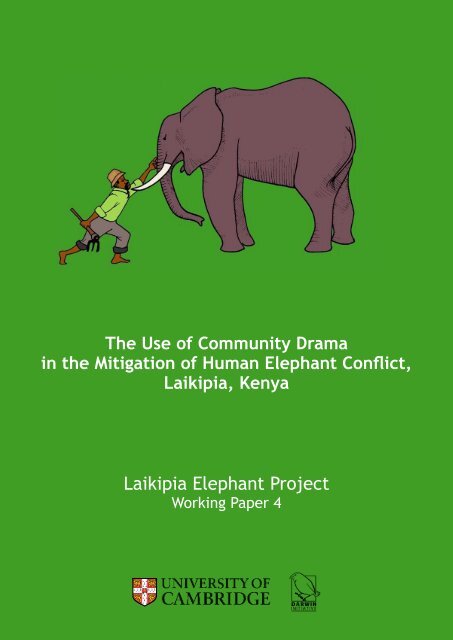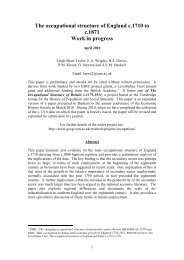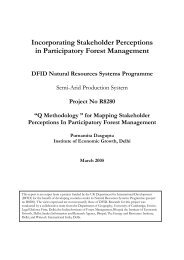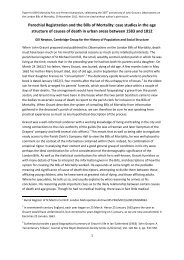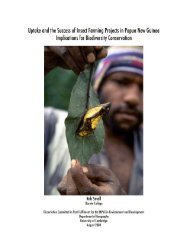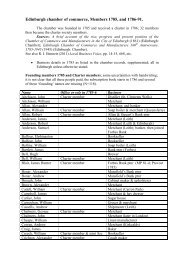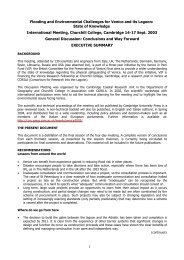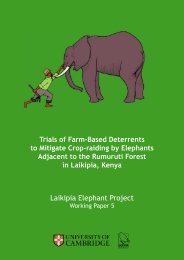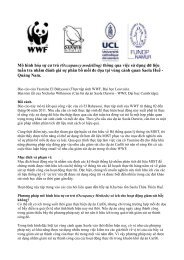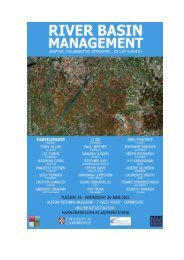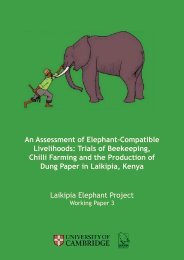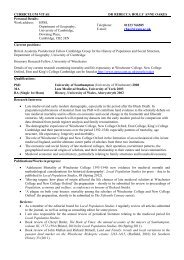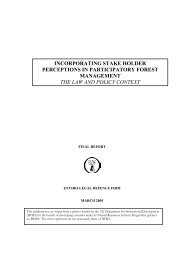Laikipia Elephant Project - University of Cambridge Department of ...
Laikipia Elephant Project - University of Cambridge Department of ...
Laikipia Elephant Project - University of Cambridge Department of ...
You also want an ePaper? Increase the reach of your titles
YUMPU automatically turns print PDFs into web optimized ePapers that Google loves.
The Use <strong>of</strong> Community Drama<br />
in the Mitigation <strong>of</strong> Human <strong>Elephant</strong> Conflict,<br />
<strong>Laikipia</strong>, Kenya<br />
<strong>Laikipia</strong> <strong>Elephant</strong> <strong>Project</strong><br />
Working Paper 4
<strong>Laikipia</strong> <strong>Elephant</strong> <strong>Project</strong><br />
Working Paper 4<br />
The Use <strong>of</strong> Community Drama in the Mitigation <strong>of</strong> Human <strong>Elephant</strong> Conflict, <strong>Laikipia</strong>, Kenya<br />
Max Graham 1,2, Tobias Ochieng Nyumba 1,3, Gabriel Kahiro 1,3,4 , Kelvin Mutugi 5<br />
and William M. Adams 1<br />
November 2009<br />
1. <strong>Laikipia</strong> <strong>Elephant</strong> <strong>Project</strong>, Private Bag, Cape Chestnut, Nanyuki, Kenya.<br />
2. <strong>Department</strong> <strong>of</strong> Geography, <strong>University</strong> <strong>of</strong> <strong>Cambridge</strong>, <strong>Cambridge</strong>, UK.<br />
3. <strong>Laikipia</strong> Wildlife Forum, PO Box 764, Nanyuki, Kenya.<br />
4. Durrell Institute for Conservation Ecology, <strong>University</strong> <strong>of</strong> Kent, UK<br />
5. Community Thespians, <strong>Laikipia</strong> <strong>Elephant</strong> <strong>Project</strong>, Private Bag, Cape Chestnut,<br />
Nanyuki, Kenya<br />
Acknowledgements<br />
This study is an output <strong>of</strong> work funded by the UK Government’s Darwin Initiative for the Survival<br />
<strong>of</strong> Species (grant no. 15/040). The Centre for Training and Research in Arid and Semi-Arid Lands<br />
Development provided institutional support. Design and layout were done by James Youlden.<br />
Jasper Graham helped with the original script.<br />
Correct Citation:<br />
Graham, M.D., Nyumba, T.O. Kahiro, G., Mutugi, K. and Adams, W.M. (2009) The Use <strong>of</strong> Community<br />
Drama in the Mitigation <strong>of</strong> Human <strong>Elephant</strong> Conflict, <strong>Laikipia</strong>, Kenya, <strong>Laikipia</strong> <strong>Elephant</strong><br />
<strong>Project</strong>, Nanyuki, Kenya
Executive Summary<br />
This paper reports experience under Darwin Initiative project 15/040 on the use <strong>of</strong> community<br />
drama to spread awareness <strong>of</strong> techniques to mitigate human-elephant conflict in <strong>Laikipia</strong> in<br />
north-central Kenya. Drama can be an effective way <strong>of</strong> generating public understanding <strong>of</strong> conservation<br />
problems. It can overcome the barrier <strong>of</strong> literacy, and create opportunities for discussion<br />
<strong>of</strong> complex, contested and controversial issues in a relatively safe and open environment.<br />
The <strong>Laikipia</strong> <strong>Elephant</strong> <strong>Project</strong> recruited a local drama group based in the town <strong>of</strong> Nanyuki, to<br />
develop and perform an interactive play about human-elephant conflict that could be performed<br />
with communities <strong>of</strong> smallholder farmers on <strong>Laikipia</strong>.<br />
The play was first performed in 2007, focusing on building community awareness <strong>of</strong> tools available<br />
for the defence <strong>of</strong> crops against elephants (such as chilli fences, smoke etc.). In 2008, the<br />
play was rewritten to engage communities in the challenges <strong>of</strong> managing the new electric West<br />
<strong>Laikipia</strong> Fence, funded by a donor grant to the <strong>Laikipia</strong> Wildlife Forum. Both versions <strong>of</strong> the play<br />
are reproduced in Appendices.<br />
Informal assessments <strong>of</strong> the effect <strong>of</strong> the drama suggest that it has played a significant role in<br />
promoiting debate, understanding, and has helped contribute to attitude and behaviour change.<br />
As one <strong>of</strong> the actors put it ‘if people see the play they understand’.<br />
<strong>Laikipia</strong> <strong>Elephant</strong> <strong>Project</strong> Working Paper 4 / Page 1
Background<br />
The idea <strong>of</strong> ‘community conservation’ became an important element in conservation thinking<br />
and planning globally in the closing decades <strong>of</strong> the twentieth century (Western et al. 1994,<br />
Hulme and Murphree 2001, Brosius et al. 2005, Adams 2008). Community-based conservation<br />
initiatives ranged from ‘people and park’ projects to ‘community-based natural resource<br />
managementbased on consumptive use <strong>of</strong> wildlife (Barrow and Murphree 2001, Hutton and<br />
Leader-Williams 2003, Hutton et al. 2005).<br />
Ideas and practices in community-based conservation have drawn extensively on participatory<br />
approaches that became standard practice in development (Nelson and Wright 1995). Slowly<br />
experience has been gained <strong>of</strong> strategies to empower local communities to be powerful and<br />
effective partners, potentially leading partners, in conservation. Systems for building trust,<br />
resolving disputes and procedures for taking action that might lead to successful conservation<br />
and resource governance became increasingly well developed (O’Riordan and Stoll-Kleemann<br />
2002).<br />
It has been increasingly widely accepted that social and human capital are central to success<br />
in conservation, because they underpin the establishment <strong>of</strong> relations <strong>of</strong> trust between<br />
conservationists and resource users. Pretty (2002) argues that conservation needs to be based<br />
on ‘collective cognitive action’ (p. 69), and argues that participation and ‘inclusive social learning’<br />
are important in conservation. An element that is critical to the success <strong>of</strong> conservation<br />
initiatives that seek to take account <strong>of</strong> the interests <strong>of</strong> local communities is the availability <strong>of</strong><br />
knowledge, both about the conservation resource, and conservation strategy (Jacobson et al.<br />
2006). Conservation education has become an important element <strong>of</strong> conservation programmes in<br />
many contexts (Jacobson et al. 2006).<br />
The importance <strong>of</strong> information exchange is particularly marked where human-wildlife conflict<br />
is a problem. Such conflict can be severe, involving injury and deaths and damage to property<br />
and crops (Woodr<strong>of</strong>fe et al. 2005), as well as hidden costs, such as the imposition <strong>of</strong> curfews by<br />
large dangerous animals which are important but more difficult to quantify (Hill 2004; Naughton-<br />
Treves 1997). In rural Kenya, human-elephant conflict is a significant problem, especially where<br />
land managed for conservation adjoins farmland (Thouless 1994; Kangwana 1995, Omondi et al.<br />
2004). Efforts to reduce direct and indirect costs <strong>of</strong> human-elephant conflict to tolerable levels<br />
have focused on traditional farm-based deterrents (the use <strong>of</strong> watchtowers, fires, ditches and<br />
loud noises), novel farm-based deterrents (chilli grease fences, fireworks and powerful electric<br />
lights) and the creation <strong>of</strong> barriers such as electrified fences (Thouless and Sakwa 1995, Sitati<br />
and Walpole 2006, Graham and Ochieng 2008, Osborn and Parker 2003,Walpole and Linkie 2007)<br />
Building capacity to alleviate human-elephant conflict<br />
Between 2006 and 2009, the UK Darwin Initiative funded a three-year programme in the <strong>Laikipia</strong><br />
Plateau in north-central Kenya (<strong>Project</strong> 15/040 Building Capacity to Alleviate Human-<strong>Elephant</strong><br />
Conflict in North Kenya). Its purpose was to ‘alleviate human-elephant conflict and promote<br />
tolerance <strong>of</strong> elephants in <strong>Laikipia</strong> District, Kenya’. A key output <strong>of</strong> this project involved ‘dissemination<br />
<strong>of</strong> information on <strong>Elephant</strong> Conservation and Human-<strong>Elephant</strong> Conflict Management<br />
among vulnerable communities and conservation practitioners’ (Logframe Output 4).<br />
As part <strong>of</strong> its work, the project undertook a range <strong>of</strong> information dissemination work, including<br />
a comic book addressing human-elephant conflict in <strong>Laikipia</strong>, a poster about human-elephant<br />
conflict, and a school essay competition about elephants. It also developed a community drama<br />
to explore issues around human-elephant conflict. That initiative is the subject <strong>of</strong> this paper.<br />
<strong>Laikipia</strong> <strong>Elephant</strong> <strong>Project</strong> Working Paper 4 / Page 2
The Study Area<br />
The <strong>Laikipia</strong> Plateau (9,700 km2) comprises three districts in north-central Kenya at an elevation<br />
<strong>of</strong> 1700-2000m above sea level, northeast <strong>of</strong> the Aberdare highlands and northwest <strong>of</strong> Mt. Kenya.<br />
<strong>Laikipia</strong> has the second highest density <strong>of</strong> wildlife in Kenya, after the Maasai Mara, including<br />
the country’s second largest population <strong>of</strong> more than 3,000 elephants. There are high levels<br />
<strong>of</strong> human-elephant conflict, particularly crop-raiding on smallholder farms in the south <strong>of</strong> the<br />
plateau (Thouless 1994; Graham 2007).<br />
Annual rainfall on <strong>Laikipia</strong> falls from 750 mm in the south to 300 mm on the lower northern part<br />
<strong>of</strong> the plateau (Berger 1989). Precipitation is bimodal, with ‘long rains’ April - June, and ‘short<br />
rains’, October - December, although rain may fall at any time <strong>of</strong> year. Variations in altitude and<br />
rainfall are associated with marked changes in land use, ranging from upland forest (with various<br />
forms <strong>of</strong> protected area status), through smallholder cultivation to savannah either managed traditional<br />
transhumant pastoralism, or in large-scale commercial ranches or wildlife conservancies.<br />
There is extensive commercial wheat and irrigated flower and vegetable cultivation in eastern<br />
<strong>Laikipia</strong>. Tourism based on the wildlife resource increasingly plays a role in the local economy.<br />
Drama in Conservation<br />
Drama is widely recognized as an extremely<br />
effective way <strong>of</strong> generating public understanding<br />
<strong>of</strong> conservation problems. Drama<br />
breaks the barriers <strong>of</strong> literacy, and creates<br />
opportunities for discussion <strong>of</strong> complex,<br />
contested and controversial issues in a<br />
relatively safe and open environment.<br />
Moore (2009) points out the importance <strong>of</strong><br />
the stories told about elephants among Khwe<br />
people <strong>of</strong> northern Namibia in helping in the<br />
avoidance <strong>of</strong> human-elephant conflict, and<br />
that such indigenous technical knowledge<br />
can be recalled and re-learned through social<br />
exchange. Drama provides a rich stimulus<br />
and opportunity for such learning.<br />
Television ‘soaps’ and radio plays have been widely used to promote debate and disseminate<br />
information about a range <strong>of</strong> policy issues relating to health, environment and development.<br />
Thus in India, the Karnataka Centre for Ecological Sciences created a 14-episode interactive<br />
radio drama with All India Radio as a contribution to the creation <strong>of</strong> a biodiversity action plan for<br />
Karnataka State (Apte 2005).<br />
However, many rural people do not have access to television or radio. Here ‘street theatre’ has<br />
an important role. Thus, in 1999, the World Bank funded a collaborative programme between<br />
Theatre for Africa Community Outreach Program, Africa Resources Trust and a network <strong>of</strong> 20<br />
NGOs working in seven southern African countries to promote conservation and community development<br />
(web.worldbank.org/2009). The program used theatrical and other artistic techniques<br />
to develop innovative communication mechanisms. The specific goals were to improve communications<br />
between rural communities and urban decision makers; exchange lessons and ideas<br />
on natural resource management throughout southern Africa; and promote local employment<br />
through the development <strong>of</strong> local theatre groups. Fourteen actors, two from each country were<br />
selected and trained in drama, extension and communications. They returned to their countries<br />
<strong>of</strong> origin and performed a series <strong>of</strong> plays with specifically researched environmental education<br />
messages and assisted communities and local decision-makers address key environmental issues.<br />
<strong>Laikipia</strong> <strong>Elephant</strong> <strong>Project</strong> Working Paper 4 / Page 3
In Harda District <strong>of</strong> Madya Pradesh in India, a street play was used by researchers on the <strong>Cambridge</strong><br />
Harda project, funded by the UK Government DFID, to explore the relationship between<br />
adivasi communities and the forests, and the Indian Forest <strong>Department</strong>. Following training, a<br />
play (with songs) The Story <strong>of</strong> a Forest was performed in 24 villages. Those attending agreed<br />
with the portrayal <strong>of</strong> the relationships between Forest department, NGO and government and<br />
forest dwellers, and in some instances they spontaneously began to debate the issues raised<br />
(Bharat Gyan Vigyan Samiti 2005).<br />
In Liberia a pr<strong>of</strong>essional theatre group, House <strong>of</strong> Freedom, were recruited by Fauna & Flora<br />
International to write a play about Sapo National Park. The Monrovia-based pr<strong>of</strong>essional group<br />
trained a local troupe, Community Conservation Promoters (CCP), in acting, drumming and<br />
dancing skills. The play was performed by CCP in Jalay Town, home to the Headquarters <strong>of</strong> Sapo<br />
National Park in 2009 (http://www.fauna-flora.org/news_liberia_ccp.php).<br />
Human-<strong>Elephant</strong> Conflict Drama<br />
Under Darwin <strong>Project</strong> 15/040, the <strong>Laikipia</strong> <strong>Elephant</strong> <strong>Project</strong> recruited a local drama group<br />
based in the town <strong>of</strong> Nanyuki, Raukati Theatre, in October 2006. The aim was to develop and<br />
perform a play about human-elephant conflict that was interactive, developing issues concerning<br />
the conservation and management <strong>of</strong> elephants with communities affected by human-elephant<br />
conflict in <strong>Laikipia</strong>.<br />
The drama group was originally formed in 1999, and created and performed a variety <strong>of</strong> community<br />
plays relating to the environment (water supply and shortage and sanitation) and health<br />
(particularly AIDS). The group was led by its founder Kelvin Mutugi, and its members evolved<br />
over time. By 2009, the name <strong>of</strong> the group had changed to Community Thespians, a group<br />
<strong>of</strong>fering a range <strong>of</strong> dramatic services including awareness creation, community mobilization,<br />
participatory educational theatre and entertainment (communitythespians@gmail.com).<br />
Five actors from the group were typically involved in each performance, playing a wider variety<br />
<strong>of</strong> parts.<br />
The play was first performed in 2007. Initially, it focused on building community awareness <strong>of</strong><br />
tools available for the defence <strong>of</strong> crops against elephants (such as chilli fences, smoke etc.).<br />
After the first performances, the play was developed so that it could be performed under a<br />
range <strong>of</strong> different circumstances and can be used to help local stakeholders understand HEC, and<br />
so help reduce tension between the wildlife authorities and local communities (Table 1).<br />
In 2008, the <strong>Laikipia</strong> Wildlife Forum had received funding for the construction <strong>of</strong> an electric<br />
fence across the District to try to provide a permanent barrier to crop raids. This generated a<br />
new set <strong>of</strong> issues for communities, relating to the management <strong>of</strong> the fence (repairing breakages,<br />
reporting problems, maintain voltage etc.), and new relationships with local large landowners<br />
and wildlife authorities. The script was therefore rewritten to reflect these new issues,<br />
to build awareness <strong>of</strong> issues around the management <strong>of</strong> electrified fences, and specifically to<br />
contribute to the project’s efforts on behalf <strong>of</strong> the <strong>Laikipia</strong> Wildlife Forum to engage smallholder<br />
farmers in the management <strong>of</strong> the West <strong>Laikipia</strong> Fence.<br />
The play was performed interactively, with dialogue extemporised by actors, <strong>of</strong>ten with extensive<br />
participation from the audience. Two versions <strong>of</strong> the play are presented in Appendices: the<br />
earlier version, focusing on community-based elephant defence (Pulling Together, Appendix 1),<br />
and the later version, focusing on the problems <strong>of</strong> managing the electric fence (A New Beginning,<br />
Appendix 2). The broad plot <strong>of</strong> A New Beginning, much <strong>of</strong> it common to both versions, is<br />
set out in Box 1.<br />
<strong>Laikipia</strong> <strong>Elephant</strong> <strong>Project</strong> Working Paper 4 / Page 4
Box 1 : The Plot <strong>of</strong> the Play<br />
NB: The broad pattern <strong>of</strong> the plot and the main characters<br />
have remained constant, the detail is adapted each time.<br />
Characters<br />
1. King’uriu - a middle-aged man, shaggy and mad<br />
2. Badilisha – a divorced middle aged man, active in elephant fence committees<br />
3. Kameme – a woman who is the village gossip<br />
4. Jikaze – a hard working, divorced and childless woman<br />
5. Kifagio – a lazy mother <strong>of</strong> nine children, now expecting a tenth. She likes every<br />
thing free.<br />
6. Various <strong>of</strong>ficials and outsiders – KWS <strong>of</strong>ficers, Ranchers, <strong>Laikipia</strong> Wildlife Forum<br />
7. An <strong>Elephant</strong><br />
Scene One<br />
The play opens with King’uriu getting a flashback to the crop raiding season.<br />
The scene captures the loss, desperation and emotions that go through a farmers<br />
mind when and after elephants crop raided.<br />
Scene Two<br />
Badilisha and Jikaze meet and discuss their divorce because <strong>of</strong> Badilisha’s obsessive<br />
concern about crop-raiding elephants. Gossip between Kifagio and Jikaze about the fence.<br />
Jikaze is faithful, loves one man and waited on hope. Kifagio is very different – she loves<br />
everything free – education, maternity, love. She even desires free labour and asks her<br />
friend to help her with her field. After the women gossipers leave the stage an elephant<br />
breaks through the electric fence and destroys Jikaze’s crop.<br />
Scene Three<br />
A shocked Jikaze finds her farm raided by elephants. She shouts for help. Her neighbours<br />
and her friend Kifagio come and they start wondering how an elephant can break through<br />
the fence. Issues that come to the fore about who the fence belongs to, who maintains it,<br />
how the community contributes to the maintenance, and the way forward in the village.<br />
The scene ends with a marriage proposal being revisited<br />
Scene Four<br />
A woman comes with a new born baby on stage. She laments about the high fees <strong>of</strong> having<br />
her baby baptized. A wedding party arrives and the woman interrupts the proceedings<br />
to ask for the baby be baptized because the priest is there anyway. They name the baby<br />
Fence Mapambano (struggle) and hope to live happily ever after<br />
Performance and Community<br />
Performances <strong>of</strong> the play typically took place outdoors, in a cleared space adjacent to a<br />
building where actors can change. A fence or other barrier allowed actors to enter and leave.<br />
Scene changes were indicated simply by actors themselves.<br />
The play has been performed in a wide variety <strong>of</strong> contexts, including schools, local trading posts<br />
and communities (Table 1). On some occasions the play was presented to audiences outside<br />
the local community context to inform policy makers about HEC issues. So, for example, the<br />
play was performed at the Nanyuki Agricultural Show at the request <strong>of</strong> CETRAD so that visiting<br />
<strong>Laikipia</strong> <strong>Elephant</strong> <strong>Project</strong> Working Paper 4 / Page 5
government <strong>of</strong>ficials could watch and learn from the performance. It was also performed at the<br />
<strong>Laikipia</strong> Wildlife Forum AGM, and to a meeting <strong>of</strong> Kenyan wildlife conservationists discussing the<br />
Wildlife Bill.<br />
Table 1. HEC Play Performances<br />
Date Location Event Play Type<br />
March 2007 Nanyuki Sports Club Dress rehearsals Crop defence<br />
March 2007 Raya Primary School Parents meeting Crop defence<br />
May 2007 Mutara Labour day Crop defence Crop defence<br />
May 2007 Rumuruti Headteachers’ meeting<br />
Crop defence<br />
June 2007 Lewa Conservancy Lewa Marathon Crop defence<br />
August 2007 Kinamba Community Meeting<br />
on HEC mitigation<br />
Crop defence<br />
January 2008 Ol Maisor LWF Unit Meeting Crop defence<br />
January 2008 Sports Club Dress rehearsals Electric fence<br />
March 2008 Ex-erok Community Meeting<br />
on HEC mitigation<br />
Electric fence<br />
The location and timing <strong>of</strong> performances <strong>of</strong> the play were the result <strong>of</strong> discussions between<br />
senior project staff, local conservation partners and other stakeholders (such as District Officers).<br />
A critical element in the planning was the Community Scouts, employed by the project<br />
in local communities, to collect data on crop raiding (and latterly fence-breaking) incidents,<br />
and promote human-elephant conflict mitigation activities by local people. The scouts ‘tell the<br />
mood <strong>of</strong> the people’ to the drama group, and identify any particular problems in the area<br />
(Interviews 1 September 2009).<br />
At each performance, Community Scouts and other project staff acted as facilitators to explain<br />
and discuss critical issues at various stages <strong>of</strong> the drama. The actors are briefed before each<br />
performance on particular local issues (and characters), and are able to use this knowledge<br />
to tailor their performance in order to draw the audience into the discussion. There is a high<br />
degree <strong>of</strong> extemporization and spontaneous in-character humour and debate. Audiences are<br />
also drawn in by the actors themselves into discussions <strong>of</strong> issues <strong>of</strong> elephant, fence, family or<br />
morality.<br />
The effectiveness <strong>of</strong> drama as a conservation tool is hard to assess in a field situation, especially<br />
where (as in the case) they are performed in locations lacking all amenities, and where the<br />
audience is free to come and go (so ‘before and after’ survey methodology would be hard to<br />
use effectively). Furthermore, the play was intended to stimulate debate and discussion, and<br />
discussion with the drama group and other local partners led to the conclusion that any kind <strong>of</strong><br />
formal questionnaire-based assessment would be unhelpful. We were influenced by the ‘most<br />
significant change’ method described by Wilder and Walpole (2008), although the project lacked<br />
the staff to develop a formal MSC methodology. Instead, we interviewed two groups most concerned<br />
with the drama, the drama group itself (Box 2), and the local Community (Box 3), in an<br />
attempt to identify ‘stories <strong>of</strong> positive change’ and ‘stories <strong>of</strong> negative or unexpected change’,<br />
as described by Wilder and Walpole (2008).<br />
<strong>Laikipia</strong> <strong>Elephant</strong> <strong>Project</strong> Working Paper 4 / Page 6
Table 2. Stories from the Drama Group Interviews in English 1 September 2009<br />
1 ‘If people see the play they understand’ D1<br />
2 ‘Angry farmers who have been raided laugh’ D2<br />
3 ‘After the performance, people become willing to form fence management D3<br />
committees, contribute labour and deal with breakages’<br />
4 ‘People say the play is very good’ D4<br />
5 ‘People say they see the need to change’ D5<br />
6 ‘The play attracts everyone – senior people and ordinary people all together, so D6<br />
the senior people understand the problems’<br />
7 ‘KWS [Kenya Wildlife Service] think they know the problems and lecture people, D7<br />
but when they see the play they laugh too, so they understand the problem<br />
– and people understand conservation, so their work becomes easier’<br />
8 ‘As a topic, environment is hard. Telling people how to relate to animals is<br />
harder than AIDS or water because you have to tackle issues people distrust and<br />
dislike’ D8.<br />
D8<br />
Table 3. Stories from the Community Scouts Interviews 3 September 2009,<br />
in a mixture <strong>of</strong> English and translated from Swahili<br />
1 ‘Before the drama, people didn’t know well about elephants or any benefits C1<br />
<strong>of</strong> elephants. People didn’t know how they could defend themselves against<br />
elephants’<br />
2 ‘Before people considered elephants as pests. They didn’t know what their C2<br />
contribution to human elephant conflict was e.g. blocking rivers for irrigation<br />
and attracting elephants’<br />
3 ‘They didn’t know they could participate in reporting incidents – reporting was C3<br />
someone else’s job. The role <strong>of</strong> the Committee was not seen’<br />
4 ‘The play shows lots <strong>of</strong> myths – about unfaithfulness and family breakdown C4<br />
because men stay out in the field at night’<br />
5 ‘Where the fence existed people didn’t know how it worked’ C5<br />
6 ‘The drama brought unity’ C6<br />
7 ‘Before the drama people had a lack <strong>of</strong> knowledge about organizations like LWF C7<br />
[<strong>Laikipia</strong> Wildlife Forum] and KWS [Kenya Wildlife Service]’<br />
8 ‘Before the drama people didn’t see elephants as a conservation issues – elephants<br />
C8<br />
were just around’<br />
9 ‘Before the drama, one Mzee [old man] thought the fence was the solution, but C9<br />
the drama changed his perception <strong>of</strong> how the fence worked. He realized that<br />
he needed to be there to cut the grass around the fence and repair and keep<br />
the fence voltage high’<br />
10 ‘After the drama the Vice-Chairman <strong>of</strong> the Rumuruti Fence Committee decided C10<br />
to call a meeting to tell people about monitoring and to keep the fence maintained’<br />
11 ‘At Ol Moran the audience had lots <strong>of</strong> drunken Turkana and Pokot men who were C11<br />
aggressive and angry because the actors were Kikuyu. They were angry about<br />
the fence and because they were being told not to cut the fence and about the<br />
elephants and because they were being blamed’<br />
12 ‘The drama is more effective than the comic book because most people in the C12<br />
area can’t read’<br />
13 ‘The first time the drama was performed mobilized people, so the second time<br />
more people come because those who saw it the first time told them’<br />
C13<br />
<strong>Laikipia</strong> <strong>Elephant</strong> <strong>Project</strong> Working Paper 4 / Page 7
Discussion<br />
The strategy <strong>of</strong> asking actors and project staff to think about the play, and recall and share<br />
stories about its successes and failures, was interesting. It is not surprising that many <strong>of</strong> the<br />
comments were positive – interviews were done by a senior expatriate team member (Adams),<br />
and the common pattern <strong>of</strong> people reporting upwards only good news can be expected. However,<br />
interviewees showed a visible pride in the drama on the part <strong>of</strong> both actors and project<br />
staff. There was a simple sincerity to statements such as ‘people say the play is very good’<br />
(Story D1). The impact <strong>of</strong> the play was clear from the way those who had seen it encouraged<br />
others to see it (‘the second time more people come because those who saw it the first time<br />
told them’ (C13). When the play was performed before an audience <strong>of</strong> elephant ‘experts’ at the<br />
Regional Human-<strong>Elephant</strong> Conflict Workshop in September 2009, it attracted an almost instant<br />
crowd <strong>of</strong> local staff from the Mpala Research Centre, and achieved a high level <strong>of</strong> engagement in<br />
the human (and human-animal) drama it presented.<br />
Moreover, not all stories were good: Story C11 described a near-disaster when Pokot pastoralists<br />
reacted badly to the focus <strong>of</strong> the play on the fence, whose construction the pastoralists opposed,<br />
and its presentation by a Kikuyu acting team. As one actor said ‘as a topic, environment<br />
is hard. Telling people how to relate to animals is harder than AIDS or water because you have<br />
to tackle issues people distrust and dislike’ (D8).<br />
The stories recorded about the play suggest that it contributed in two ways: it promoted understanding,<br />
and it promoted changes in attitude and associated communal action.<br />
Understanding<br />
The contribution <strong>of</strong> the play to the understanding <strong>of</strong> human-elephant conflict on the part <strong>of</strong><br />
those who saw it is clear from numerous stories. As anticipated, the drama was judged more<br />
effective than the comic book’ because most people in the area could not read’ (C12): as one<br />
actor put it ‘if people see the play they understand’ (D1). Before they saw the play, people<br />
just considered elephants as pests, and did not know <strong>of</strong> ‘any benefits <strong>of</strong> elephants’, or how they<br />
could defend their crops against them, (C1, C2, C8). The play provided information about how<br />
the electric fence worked (C5), and about the work <strong>of</strong> organizations such as the <strong>Laikipia</strong> Wildlife<br />
Forum and the Kenya Wildlife Service (C7). The play also addressed social issues related to crop<br />
raiding, like the problem <strong>of</strong> unfaithfulness and family breakdown because men stayed out in the<br />
field at night (C4).<br />
The play was effective not only in communicating downwards (from project to community), but<br />
upwards, from village to <strong>of</strong>ficialdom: the play attracted’ everyone – senior people and ordinary<br />
people all together, so the senior people understand the problems’ (D6), and even the Kenya<br />
Wildlife Service (who ‘think they know the problems and lecture people’) laugh when they see<br />
the play ‘so they understand the problem (D7).<br />
Attitude and Activities<br />
With increased understanding <strong>of</strong> the problem <strong>of</strong> human-elephant conflict, the play (and especially<br />
its humorous style <strong>of</strong> storytelling) helped change attitudes. As one actor put it ‘angry farmers<br />
who have been raided laugh’ (D2), and having laughed, saw the opportunity to act differently<br />
(D5). Knowledge was empowering: the play ‘brought unity’ (C6). Local people realize they<br />
had a role in reporting fence breakage incidents: before the play ‘they didn’t know they could<br />
participate in reporting incidents – reporting was someone else’s job. The role <strong>of</strong> the Committee<br />
was not seen’ (C3).<br />
<strong>Laikipia</strong> <strong>Elephant</strong> <strong>Project</strong> Working Paper 4 / Page 8
Empowerment extended to local government: after seeing the play, the Vice-Chairman <strong>of</strong> the<br />
Rumuruti Fence Committee decided to call a meeting about monitoring and fence maintenance<br />
(C10). From new insights followed an increased willingness to get involved in community work,<br />
for example cutting long grass and maintaining voltage (C9), forming fence management committees<br />
and contributing labour and deal with breakages (D3).<br />
Conclusion<br />
This experiment in the use <strong>of</strong> community drama to address issues surrounding human- elephant<br />
conflict with smallholder farmers has shown considerable promise. While the assessment <strong>of</strong><br />
impacts was rudimentary (in keeping with the low pr<strong>of</strong>ile and low investment <strong>of</strong> the initiative),<br />
the evidence suggests that the drama was enjoyed by local people (and experts), and stimulated<br />
lively discussion both within and outside the play itself. It taught those who took part things<br />
they did not know about elephants, about wildlife <strong>of</strong>ficials, and perhaps about themselves. It<br />
contributed to debate, and to the beginnings <strong>of</strong> changes in attitudes and changes in behaviour.<br />
The use <strong>of</strong> drama in such situations is not by any means novel, but the conclusion <strong>of</strong> to be drawn<br />
from this exercise is that it can have great potential as a contribution to solving otherwise<br />
intractable people-conservation issues<br />
References<br />
Adams, W.M. (2008) Green Development: environment and sustainability in a developing world, Routledge, London.<br />
Apte, T. (2005) Interactive Radio Drama, IIED, London (www.policy-powertools.org)<br />
Barrow, E. and Murphree, M (2001) ‘Community conservation: from concept to practice’, pp. 24–37 in D. Hulme and M. Murphree<br />
(Eds.) African Wildlife and Livelihoods: the promise and performance <strong>of</strong> community conservation, James Currey, London<br />
Bharat Gyan Vigyan Samiti Bhopal (2005) Street Play Report, Report <strong>of</strong> <strong>Cambridge</strong> Harda <strong>Project</strong>, <strong>Cambridge</strong> (http://www.geog.<br />
cam.ac.uk/research/projects/harda/).<br />
Brosius, J.P., Tsing, A.L. and Zerner, C. (2005) Communities and conservation: histories and politics <strong>of</strong> community-based natural<br />
resource management, Altamira Press, Walnut Creek Ca.<br />
Berger, P. (1989). Rainfall and Agro-Climatology <strong>of</strong> the <strong>Laikipia</strong> Plateau, Kenya. Berne: Geographica Bernesia, African Study<br />
Series A7.<br />
Graham, M.D. (2007). Coexistence in a land use mosaic? Land use, risk and elephant ecology in <strong>Laikipia</strong> District, Kenya. PhD thesis,<br />
<strong>University</strong> <strong>of</strong> <strong>Cambridge</strong>, <strong>Cambridge</strong>, UK.<br />
Graham, M.D. and Ochieng, T. (2008). ‘Uptake and performance <strong>of</strong> farm-based measures for reducing crop-raiding by elephants<br />
Loxodonta Africana among smallholder farms in <strong>Laikipia</strong> District, Kenya.’ Oryx 42 (1): 76-82.<br />
Hill, C.M. (2004). Farmers’ perspectives <strong>of</strong> conflict at the wildlife-agriculture boundary: some lessons learned from African<br />
subsistence farmers. Human Dimensions <strong>of</strong> Wildlife 9: 279-286<br />
Hulme D. and Murphree, M. (eds.) (2001) African Wildlife and Livelihoods: the promise and performance <strong>of</strong> community<br />
conservation. James Currey, Oxford.<br />
Hutton, J., Adams, W.M. and Murombedzi, J.C. (2005) Back to the barriers? Changing narratives in biodiversity conservation,<br />
Forum for Development Studies 32: 341-370.<br />
Hutton, J.M and Leader-Williams, N. (2003) Sustainable use and incentive-driven conservation: realigning human and conservation<br />
interests. Oryx 37:215-226<br />
Jacobson, S.K. , McDuff, M.D. and Monroe, M.C. (2006) Conservation Education and Outreach Techniques, Oxford <strong>University</strong><br />
Press, Oxford.<br />
Kangwana, K. (1995) ‘Human-<strong>Elephant</strong> Conflict: The Challenge Ahead’, Pachyderm 19:11-14<br />
Moore, L. (2009) ‘Beware the elephant in the bush: myths, memory and indigenous traditional knowledge in north-eastern<br />
Namibia’, Cultural Geographies 16: 329-349.<br />
Naughton-Treves, L. (1997) ‘Farming the Forest Edge: vulnerable places and people around Kibale National Park, Uganda. The<br />
Geographical Review 87(1): 27-46.<br />
Nelson, N. and Wright, S. (1995) Power and Participatory Development: theory and practice, Intermediate Technology Publications,<br />
London.<br />
O’Riordan, T. and Stoll-Kleeman, S. (2002) Deliberative democracy and participatory biodiversity. In O’Riordan, T. and<br />
Stoll-Kleeman, S., editors, Biodiversity, Sustainability and Human Communities: protecting beyond the protected,<br />
<strong>Cambridge</strong>: <strong>Cambridge</strong> <strong>University</strong> Press, 87-112.<br />
Omondi, P., Bitok, E. And Kagiri, J. (2004). Managing human-elephant conflicts: the Kenyan experience. Pachyderm 36: 80-86<br />
Osborn, F.V. and Parker, G. (2003) ‘Towards an integrated approach for reducing the conflict between elephants and people: a<br />
review <strong>of</strong> current research’, Oryx 37: 80-84.<br />
Pretty, J. 2002. People, livelihoods and collective action in biodiversity management. In Biodiversity, Sustainability and Human<br />
Communities: protecting beyond the protected (eds. T. O’Riordan and S. Stoll-Kleeman), pp. 61-86. <strong>Cambridge</strong> <strong>University</strong><br />
Press, <strong>Cambridge</strong>.<br />
Sitati, N.W. and Walpole, M.J. (2006) ‘Assessing farm-based measures for mitigating human-elephant conflict in Transmara District,<br />
Kenya’, Oryx, 40: 279-286<br />
<strong>Laikipia</strong> <strong>Elephant</strong> <strong>Project</strong> Working Paper 4 / Page 9
Thouless, C. (1994) Conflict between humans and elephants on private land in northern Kenya. Oryx 28(2): 119-127.<br />
Thouless, C. and Sakwa, J. (1995) ‘Shocking elephants: fences and crop raiders in <strong>Laikipia</strong> District, Kenya’, Biological Conservation<br />
72: 99-107.<br />
Walpole, M. and Linkie, M. (2007) (Eds.) Mitigating Human-<strong>Elephant</strong> Conflict: case studies from Africa and Asia. Fauna & Flora<br />
International <strong>Cambridge</strong>.<br />
Western, D., Wright , M. and Strumm, S. (1994) (eds.) Natural Connections: Perspectives in Community-based Conservation, Island<br />
Press, Washington DC.<br />
Wilder, L. and Walpole, M. (2008) “measuring social impacts in conservation: experience <strong>of</strong> using the Most Significant Change<br />
method’, Oryx 42(4): 529-38.<br />
Woodr<strong>of</strong>fe, R., S. Thirgood, S. and Rabinowitz, A. (2005). (Eds.) People and Wildlife: Conflict or Coexistence? <strong>Cambridge</strong>, UK:<br />
<strong>Cambridge</strong> <strong>University</strong> Press<br />
<strong>Laikipia</strong> <strong>Elephant</strong> <strong>Project</strong> Working Paper 4 / Page 10
Annexe 1 Text <strong>of</strong> the Play 1:<br />
Community <strong>Elephant</strong> Deterrence<br />
Pulling Together<br />
Script by<br />
Gabriel Kahiro, Kelvin Mutugi, Tobias Ochieng Nyumba, Max Graham and Jasper Graham<br />
Characters<br />
King’uriu<br />
Badilisha<br />
Kameme<br />
Jikaze<br />
Kifagio<br />
- a middle-aged man, shaggy and mad<br />
– a divorced middle aged man, active in elephant fence committees<br />
– a woman who is the village gossip<br />
– a hard working, divorced and childless woman<br />
– a lazy mother <strong>of</strong> nine children, now expecting a tenth. She likes everything<br />
free.<br />
Various <strong>of</strong>ficials and outsiders – KWS <strong>of</strong>ficers, Ranchers, <strong>Laikipia</strong> Wildlife Forum<br />
An <strong>Elephant</strong><br />
Scene I<br />
A woman is in her farm, tending her crops. Backstage groups <strong>of</strong> people are singing.<br />
Wakulima msilale, lale lale<br />
Wa-laikipia msilale, lale lale<br />
Wazee msilale, lale lale<br />
Wamama msilale, lale lale<br />
Bado mapambano, mapambano mapambano……<br />
Jikaze:<br />
Nice song, catchy rhythm, danceable beats. If only it was not describing the<br />
struggle we have with elephants. Isn’t it funny that the best song describes the<br />
worst situation.<br />
(A man is heard backstage singing)<br />
Is that Badilisha? Useless man, I hope he is not coming here<br />
Badilisha:<br />
Jikaze:<br />
Badilisha:<br />
Jikaze<br />
Badilisha:<br />
Jikaze :<br />
Ah Jambo, how are you today?<br />
The way I have been since you decided to marry elephants instead <strong>of</strong> me.<br />
That’s not fair<br />
Fairness! Are you talking <strong>of</strong> fairness? fairness my foot. For you, it is all<br />
elephants: elephant meetings, fence meetings and everything elephants<br />
No wonder they say you are the elephant man in the village. You are in every<br />
committee in the village. (Sneering) So Mr. <strong>Elephant</strong> Chairman what can I do for<br />
you?<br />
aaaah, actually I came to talk to you about us. I wanted to…<br />
Stop it there! You wanted to do what? Me and you, we are finished, go marry<br />
those elephants<br />
<strong>Laikipia</strong> <strong>Elephant</strong> <strong>Project</strong> Working Paper 4 / Page 11
Badilisha<br />
Jikaze<br />
Badilisha<br />
Jikaze<br />
Badilisha<br />
Jikaze<br />
Badilisha:<br />
Jikaze:<br />
That’s what I am talking about, we can have a normal life like other normal<br />
people should do.<br />
No we can’t, but for the first time since you were born you have talked sense.<br />
Did that come from your mouth? We can finally talk like normal people. And what<br />
about the elephants? How can we have a normal life when elephants have<br />
changes our lives to suit theirs? Tell me another one, leta ingine<br />
Please listen to me<br />
Haiya, you even know how to say please. We will change your name from<br />
Badilisha Ndovu to your proper name…<br />
Please listen, I had not paid attention to you and I realize the elephants take<br />
most <strong>of</strong> our time as a couple and I apologize.<br />
Are you trying to reconcile with me? Because…<br />
I am not only trying to reconcile with you, far from it, I want to marry you<br />
Gosh, this is the most unoriginal proposal I have ever heard. You come to my<br />
fathers’ farm, say you no longer care about elephants, you start sounding normal<br />
and when I have given you the benefit <strong>of</strong> doubt, you ask me to marry you so soon<br />
after we broke up.<br />
(A woman calls out Jikaze’s name twice)<br />
Badilisha:<br />
At least give it a try, will you?<br />
(A woman walks into stage)<br />
Kifagio<br />
Badilisha :<br />
Jikaze<br />
Kifagio<br />
Jikaze<br />
Kifagio<br />
Jikaze<br />
Kifagio<br />
Jikaze:<br />
Kifagio:<br />
Jikaze<br />
Jikaze, habari ya leo? (Noticing badilisha), mmmh and what are you doing<br />
here, Mr. <strong>Elephant</strong> Chairman?<br />
What I am doing here is none <strong>of</strong> your business. Jikaze, will I see you later?<br />
Sawa. OK. (dismisses him with a hand gesture)<br />
Did you just allow that moron into your life again? I thought he was married to<br />
elephants<br />
I didn’t allow him but for the first time in his life he talked sense. He has<br />
realized he is spending too much time chasing the damn elephants.<br />
And you have been stupid to wait that long without finding another man, you<br />
should look for a plan B like I did. Now see, I am on my tenth baby.<br />
And who is the father <strong>of</strong> this one now? A different one I guess?<br />
You know me, I am consistent. When my first husband decided chasing elephants<br />
away from the farm was more important than me, I got a side plate and see<br />
where I am. Nine and a half babies.<br />
9 and ½ ? How is that?<br />
Nine are delivered and this one (pointing to her tummy) is not yet done, so it is<br />
nine and half.<br />
Most families are breaking as a result <strong>of</strong> elephants. There is no food in<br />
the farms, the wazees are always in the guard huts at night and the women are<br />
sneaking to the lazy wazees who don’t go guarding.<br />
<strong>Laikipia</strong> <strong>Elephant</strong> <strong>Project</strong> Working Paper 4 / Page 12
Kifagio:<br />
Jikaze<br />
Kifagio<br />
Jikaze:<br />
Kifagio<br />
Jikaze<br />
Kifagio<br />
Jikaze<br />
Kifagio<br />
Jikaze<br />
Kifagio:<br />
Jikaze<br />
Kifagio:<br />
Jikaze<br />
Kifagio<br />
Jikaze<br />
Kifagio<br />
Jikaze<br />
Wee, are you talking about me?<br />
You see, they say the guilty are always afraid. I didn’t mean you, but it sure<br />
comes close to your description.<br />
Shida iko wapi? The maternity is free, post natal care is free, education is free,<br />
and love is free,<br />
free, free, freeeee. And who foots the bill for your free things?<br />
Government<br />
You see, you love free things but you never ask yourself, who pays for them<br />
I said government, and where it does not, the nine different fathers <strong>of</strong> my<br />
children.<br />
I pray to God we never get more like you. The free things you are talking about<br />
are paid for by tax money some <strong>of</strong> which comes from tourism revenue generated<br />
by wildlife including the same elephants that chased my Badilisha from my life.<br />
You are crazy like your former husband. Since when did elephants start paying?<br />
Did they pay for the free primary education? Did they pay for the labour <strong>of</strong> the<br />
new road? You are mad, now wonder Badilisha left you!<br />
You cannot reason with her. You cannot teach her any economics. She only knows<br />
one sign in mathematics. Addition: add more and more babies!<br />
Enough!<br />
By the way what free thing did you want from me?<br />
I was asking for little help with my shamba. Would you please lend me a hand?<br />
You can see my situation.<br />
Free labour, ha ha ha, free help (singing, -Bibi yangu ni mzembe, anapenda bure)<br />
(my wife is lazy, she loves free things)<br />
Will you? See how your plot has a good crop <strong>of</strong> maize and cabbages.<br />
Good crop until elephants decide it is too good to be harvested by the one who<br />
planted! In fact I might just take back Badilisha to be my husband again, at least<br />
until the crop is out <strong>of</strong> the farm.<br />
You also cannot decide what is good for you, when he is chasing elephants at<br />
night, you want him at home. When the crop is too good like now you need him<br />
to defend it, woman you need ten men to harvest this crop. One man cannot de<br />
fend this crop. Adopt my style and get ten men<br />
And ten babies to go with! Lets go, I don’t have as much free time as you.<br />
(They start leaving the stage but Jikaze turns)<br />
That crop is wonderful, those cabbages when sold will buy iron sheets for my ro<strong>of</strong>.<br />
The onions will purchase a new dress and this maize, finally I will open a bank<br />
account.<br />
Kifagio<br />
Wee twende unisaidie! Let’s go and stop dreaming, the elephants will bring you<br />
back to reality soon enough.<br />
<strong>Laikipia</strong> <strong>Elephant</strong> <strong>Project</strong> Working Paper 4 / Page 13
Scene II<br />
An elephant approaches the plot and destroys the crops by eating them and trampling them<br />
underfoot. After a few minutes shouting is heard from backstage. Jikaze approaches the<br />
farm and at first there is a look <strong>of</strong> disbelief on her face. She enters her plot, examines her<br />
crops and starts wailing<br />
Jikaze:<br />
Shetani ashindwe, this is work <strong>of</strong> the devil. Why me, why my plot,<br />
(she wails again)<br />
Noo, noo, noo,<br />
(others can be heard from back stage asking what the problem is)<br />
(she wails again)<br />
This is witchcraft, murogi, my cabbages, my onions, my maize. No mabati ro<strong>of</strong><br />
for me now. But why, oh why<br />
Kameme:<br />
Jikaze<br />
Kameme:<br />
Jikaze<br />
What’s the problem woman? Why are you yelling like you have seen a devil?<br />
But I have!<br />
What does he look like? Which kabila?<br />
I don’t know but what or who could have done this.<br />
(Two more people rush into stage)<br />
Kifagio:<br />
Jikaze<br />
What happened, you just left my place?<br />
I should not have come to your place Mrs Free Everything. See, I come to help<br />
you, forgot to defend my farm and see what happens, the devil visits my farm.<br />
(Badilisha examines the damage)<br />
Badilisha:<br />
Jikaze:<br />
Kameme<br />
Kifagio<br />
Badilisha<br />
Jikaze<br />
These elephants are too much, caigana ni ciagana (enough is enough).<br />
This time I must do something, something that will teach these elephants that<br />
this is my Jikaze’s plot<br />
What can you that you have not done already Mr. <strong>Elephant</strong> Chairman?<br />
Are you going to kill them? Yes, let’s kill them and start elephant butchery<br />
Don’t be silly, kill one and you won’t see sun. This sky will be so full <strong>of</strong><br />
helicopters looking for you and the rest <strong>of</strong> us will be clobbered by Game [Kenya<br />
Wildlife Service] to say where you are.<br />
But I will do something, something that has never been done!<br />
You are not helping us. What will you do? The evidence is fresh here. In the first<br />
instance, whose elephants is this?<br />
(asking the audience)<br />
Kameme<br />
Whose elephant is this? Wananchi whose elephants?<br />
<strong>Laikipia</strong> <strong>Elephant</strong> <strong>Project</strong> Working Paper 4 / Page 14
(He asks the audience)<br />
Jikaze:<br />
Badilisha<br />
Kameme<br />
Jikaze<br />
Kameme<br />
Badilisha<br />
Kifagio<br />
Jikaze<br />
Kifagio<br />
Badilisha<br />
Kameme<br />
Kifagio<br />
Jikaze<br />
Badilisha<br />
Jikaze<br />
Badilisha<br />
Jikaze<br />
Badilisha<br />
Jikaze<br />
Badilisha<br />
Jikaze<br />
Badilisha<br />
What are you people saying? These elephant cannot be mine or ours.<br />
If they were ours, they would be more considerate. What do I benefit from<br />
them anyway?<br />
I will do something!<br />
Shut up, how long does it take to do something!, you keep on saying I will<br />
do something. A tiger doesn’t proclaim its tigritude, it just pounces!<br />
Do what you are saying!<br />
Wait, What do you have in mind?<br />
We are used to him and elephant meetings, what new thing can you tell us?<br />
I will take the elephant to court, and we shall see whose land this is.<br />
From how long you thought about it, I was tempted to believe you had a brain<br />
wave, a completely new discovery. But alas, as usual your head is full <strong>of</strong><br />
elephant dung.<br />
That’s not fair and its’ my former husband you are talking to here.<br />
Former is the key word my dear, and the reason for the former status is<br />
elephants<br />
Shut up, woman! I will take them to court and maybe something will come out <strong>of</strong><br />
it. This time something will happen. Wait and see.<br />
I think we are getting somewhere. Wananchi mnaona je?<br />
Let me go call others; we may get free labour and compensation from the court<br />
You and free everything (others leaves) You are not leaving? What are you<br />
waiting for?<br />
eeeeh, aaaah, there is an issue I was asking you about?<br />
Which one? And remember the elephants are back!<br />
You know I love you and would really love to get back with you<br />
Tell that to the elephants, they made us separate. We got divorced before we<br />
even knew we were married<br />
I really am serious (he kneels) please Jikaze, you know I love you, will you marry<br />
me<br />
I will do that if only in the vows there is a line that says “with or without<br />
elephants till death do us part” Okay?<br />
I will see to it that the pastor puts the line there.<br />
Will he charge extra for that.<br />
No! The vows are free. (They start walking away slowly laughing holding<br />
hands) But when should we set the wedding date?<br />
<strong>Laikipia</strong> <strong>Elephant</strong> <strong>Project</strong> Working Paper 4 / Page 15
Jikaze<br />
After you win the court case against elephants<br />
Scene III<br />
The scene opens with an African courtroom where the elephant is the accused and<br />
Badalisha the complainant. A judge moderates the argument between the farmer and the<br />
elephant. Since this is an African open court each side is allowed to interact with the<br />
audience when presenting their arguments.<br />
Court Orderly All arise! The court will begin its hearing <strong>of</strong> the The People vs.<br />
The <strong>Elephant</strong>s, Honorouble Wisdom Mjanja is the presiding judge.<br />
(the judge enters and sits near the middle <strong>of</strong> the semi-circle formation <strong>of</strong> the court).<br />
Judge Mjanja This case presents a dilemma to the conventional court system for elephants<br />
can Badilisha I have brought this case here today because I have had enough <strong>of</strong><br />
these elephants destroying my crops and more importantly my social life. I plant<br />
year in, year out and the same thing happens will regularity <strong>of</strong> sunrise, elephants<br />
destroy my crops. I have come to this court to ask for one thing, lets us destroy<br />
the elephant, all <strong>of</strong> them. Lets just take pictures <strong>of</strong> them, record how they<br />
looked like and destroy this pest, or what do you say people <strong>of</strong> [insert the name<br />
<strong>of</strong> where the play is performed] ?<br />
Judge<br />
Badilisha<br />
Judge<br />
Wakili<br />
Badilisha<br />
Judge<br />
Badilisha<br />
Wakili<br />
Jikaze<br />
Are you finished?<br />
No, I have not started and I am sorry, I went to the solution before explaining<br />
the problem. Twenty years ago when we bought this land there was no elephants,<br />
it was just bush. As soon as we started clearing the bush and planting,<br />
the wretched creatures started to destroy our crops. I don’t see their benefit<br />
even as the government people keep on saying they are our heritage. I pray that<br />
this court grants me my wish to have anything related to elephants destroyed.<br />
Or what do you say? (He gets feed back and support from the audience)<br />
Sit down, may the elephant representative address the court.<br />
Some untruth was spoken here a few minutes ago.<br />
Shameless! Do you now see how shameless he is, which untruth, yesterday?<br />
Where were you? At Jikaze’s farm!<br />
Silence in court, you have had your say, let the elephant speak.<br />
Okay, but let him speak the truth<br />
I am here to speak nothing but the truth, thank you very much. As I was<br />
saying, the complainant said until twenty years ago this land was bush. I would<br />
like to ask this audience, whose bush was it? Whose bush? (He gets answers from<br />
the audience). It is not like elephants just fell from the sky when you humans<br />
settled here. We have been living in this area for ages. Unlike you, we don’t<br />
build houses but that doesn’t mean we are not there. We have been here longer<br />
than any <strong>of</strong> you.<br />
We didn’t see many elephants when we bought land, just one passing by<br />
occasionally and they didn’t raid our crops.<br />
<strong>Laikipia</strong> <strong>Elephant</strong> <strong>Project</strong> Working Paper 4 / Page 16
Wakili<br />
Jikaze<br />
Wakili<br />
Judge<br />
The reason you didn’t see us is because we still had a huge ranging area but the<br />
humans have encroached on our habitat and we are finding less and less area<br />
with all the humans settling down in this area.<br />
And why do you crop raid?<br />
Because I need to survive just like you need to survive or what do you people<br />
think? (a few heads nod)<br />
Both <strong>of</strong> you have spoken and we have heard you. I said this court is different,<br />
so today we have a different setting. We have a friend <strong>of</strong> the court who will help<br />
us reach a conclusion in arriving at an amicable solution to this case.<br />
I will ask the complainant to join the audience and the elephant to leave the<br />
courtroom while this friend <strong>of</strong> the court addresses the court. However, I need to<br />
assure the defendant that whatever the friend <strong>of</strong> the court says will not lead<br />
to granting <strong>of</strong> complainants prayer <strong>of</strong> elephant extermination. Please leave the<br />
court Mr. <strong>Elephant</strong>.<br />
(At this point, a person from the <strong>Project</strong> explains the CBPAC (Community-based Problem<br />
Animal Control) methods relevant to the area. This process is interactive with audience<br />
participating and asking for clarification).<br />
Judge<br />
Wakili<br />
Judge<br />
Wakili<br />
Judge<br />
Wakili<br />
Badilisha<br />
Thank you very much. Due to the unique circumstance <strong>of</strong> this case, we will not<br />
share this information with the accused elephant. However, we shall inform him<br />
that we have chosen to live together subject to certain conditions which will be<br />
implemented by us. Please call Mr. <strong>Elephant</strong> Wakili<br />
I am here your Honour<br />
This court has considered your plea and the accusations leveled against you.<br />
While it will not grant the prayer for your extermination, it has empowered<br />
these farmers to devise ways to keep you out <strong>of</strong> their farms. In summary,<br />
this court has ruled that we can live together but certain conditions must be<br />
met. The farmers have the initiative to keep you out <strong>of</strong> their farms.<br />
Will they hurt me?<br />
I hope not but we will find out soon enough. Thank you all for attending and good<br />
luck in working on the methods.<br />
Which methods?<br />
You will know them soon enough!<br />
Court orderly All arise (the audience disperses, a chorus is sung by those dispersing)<br />
Wakulima msilale, lale lale<br />
Wa-laikipia msilale, lale lale<br />
Wazee msilale, lale lale<br />
Wamama msilale, lale lale<br />
Bado mapambano, mapambano mapambano…<br />
<strong>Laikipia</strong> <strong>Elephant</strong> <strong>Project</strong> Working Paper 4 / Page 17
Scene IV<br />
Jikaze and Badilisha are working on Jikaze’s plot erecting a range <strong>of</strong> elephant deterrents.<br />
There is a perimeter fence with mutton cloth hang on it. There is a spotlight, and a banger<br />
stick<br />
Badilisha:<br />
Jikaze<br />
Badilisha<br />
Jikaze<br />
Badilisha<br />
Jikaze<br />
Faster, my friend, we need to set up this plot before darkness. This time we<br />
must not let the elephant destroy our crops without taking an active defense.<br />
But Badilisha, will they really work?<br />
There is only one way <strong>of</strong> knowing, by trying them. Do you remember the project<br />
man [or woman depending on who presented the methods] said that no<br />
single method is one hundred percent but when used in combination they make a<br />
difference?<br />
What do you mean?<br />
You need to use a combination <strong>of</strong> methods to keep elephants out <strong>of</strong> the farm.<br />
Remember these are very clever animals so we need to stay ahead <strong>of</strong> them all<br />
the time.<br />
You are sounding very intelligent there, but maybe just less intelligent than the<br />
elephants. How can we apply all this methods?<br />
(Kifagio walks towards the two)<br />
Badilisha<br />
Kifagio<br />
Jikaze<br />
Badilisha<br />
Kifagio<br />
Bure kabisa, Mrs Free Everything is here.<br />
Now, what in God’s name has gotten into you? What are these strings, torches,<br />
walking sticks, chili, and elephant dung for? Are you people trying to practice<br />
witchcraft on elephants or what?<br />
Ask him, he was about to explain!<br />
I will say two things to you. One, I am glad you delivered your baby safely and<br />
two it is time to close the store. No more babies for you, the tax payer is feeling<br />
the pinch <strong>of</strong> paying for your free everything<br />
We didn’t come here to talk about babies. You talk rubbish most <strong>of</strong> the time<br />
anyway. No wonder she left you.<br />
Jikaze<br />
Hey, you two stop! It’s obvious you don’t like each other but this is neither the<br />
time nor the place. We have work to do. Explain Badilisha<br />
Badilisha<br />
Kifagio<br />
Badilisha<br />
I am sorry my dear. As I was saying, we need to use a combination <strong>of</strong> measures<br />
like the spotlights, an early warning system which is what I am setting with a<br />
bicycle alarm here, and also defend our farms in a more coordinated manner to<br />
avoid opportunistic attacks by elephants.<br />
I certainly won’t put that paraphernalia in my farm. When you are finished doing<br />
this, your farm will look like some bored kindergarten children made it their<br />
playground<br />
Go away woman, there are always people like you in the society, and if you don’t<br />
put a defense around your farm you are helping the elephants attack the farms<br />
<strong>of</strong> those who have, because your farm presents the path <strong>of</strong> least resistance<br />
<strong>Laikipia</strong> <strong>Elephant</strong> <strong>Project</strong> Working Paper 4 / Page 18
Jikaze<br />
Hear that Kifagio! Badilisha is sounding intelligent these days. I guess the<br />
elephant seminars had their use after all. What did you want, because with<br />
Badilisha talking intelligently like that you are disrupting our quality time?<br />
Kifagio Actually I was asking if you would agree to be the godmother at the baptism <strong>of</strong><br />
my son. Please Jikaze, you are so hardworking, I hope it will rub <strong>of</strong>f on him.<br />
Badilisha<br />
Jikaze<br />
Badilisha<br />
Kifagio<br />
Jikaze<br />
Actually, that is a good idea; let us have him baptized at our wedding<br />
Whose wedding? We have not agreed yet!<br />
Don’t worry, we will agree after you see how elephant defense works.<br />
We will certainly have more time together because it is the elephants that will<br />
be calling whenever they break this early warning system. This will be right next<br />
to our bed, if they break and before they destroy crops my friends and I will be<br />
upon them with spot lights and if they resist we will use the banger stick.<br />
Lets wait and see. I have to go, my baby is crying but thanks for agreeing that he<br />
is baptized at you wedding (She leaves the stage)<br />
Did we actually agree?<br />
Badilisha leave her alone, the priest will agree anyway and I think after tonight you will<br />
see we can defend our farms and leave a near normal life.<br />
Jikaze<br />
Lets wait and see. (they leave the stage)<br />
Wakulima msilale…..<br />
Lale, lale……<br />
<strong>Elephant</strong>s approach the farm and try to break through the perimeter fence. An alarm<br />
sounds and Badilisha, Jikaze and other villagers chase them away using CBPAC methods.<br />
Badilisha<br />
Kifagio<br />
Badilisha<br />
Kifagio<br />
Jikaze<br />
Kifagio<br />
Jikaze<br />
Badilisha<br />
Jikaze<br />
Badilisha<br />
It worked, the alarm worked. And to imagine it is just a bicycle alarm. It<br />
worked. Thank you all for helping me, this is what we need, working together,<br />
defending our farms in a more coordinated fashion.<br />
But my farm was attacked, what shall I do?<br />
I am tempted to tell you to wait and see but I will ask my friends to help me put<br />
CBPAC defenses in your farm. But your boys and <strong>of</strong> course your many male friends<br />
will need to help.<br />
Lets do it. I can’t afford to lose this crop, not with all these babies to feed.<br />
He will after the wedding.<br />
Which wedding?<br />
I am going to marry him again. He is intelligent and he has demonstrated leader<br />
ship tonight. What do you say Badilisha?<br />
For the first time in my life, I don’t have words. Just one word, when?<br />
Tomorrow<br />
Then tonight is Christmas!<br />
Wakulima msilale, lale lale<br />
Wa-laikipia msilale, lale lale<br />
<strong>Laikipia</strong> <strong>Elephant</strong> <strong>Project</strong> Working Paper 4 / Page 19
Wazee msilale, lale lale<br />
Wamama msilale, lale lale<br />
Bado mapambano, mapambano mapambano<br />
Scene V<br />
A man in priestly robes walks in. He has a bible, a priestly collar, and a cassock. A child<br />
can be heard crying in the background. A couple in wedding dress walks<br />
Priest:<br />
Audience:<br />
Priest:<br />
Audience:<br />
Priest<br />
Praise the Lord, brothers and sisters. (He pauses) that was a very small Amen.<br />
Can I hear a bigger Amen- Praise the Lord!<br />
Amen!<br />
We are gathered here today for a very special purpose. Brothers and sisters, a<br />
couple who had been separated by elephants, would you believe it, are remarry<br />
ing again brothers and sisters Can I get an Amen?<br />
Amen<br />
Jikaze and Badilisha were in this very church for their first wedding and hardly<br />
had they gone home that evening when elephants invaded their farm. Badilisha<br />
being a proper farmer went to chase the elephants and he has not been in his<br />
home for more than a few hours every day Kifagio ngoja Pastor, Now that there is<br />
<strong>Laikipia</strong> <strong>Elephant</strong> <strong>Project</strong> Working Paper 4 / Page 20
a wedding, will you baptize my child for free<br />
Jikaze<br />
Priest<br />
Priest<br />
Badilisha<br />
Priest<br />
Jikaze<br />
Priest<br />
Badilisha<br />
Priest<br />
Kifagio<br />
Priest<br />
Badilisha<br />
Jikaze<br />
Kifagio<br />
Priest<br />
Bure kabisa, everything free!<br />
I will baptize your child for free no problem (the woman ululates)<br />
Without much ado let us start.<br />
Do you Badilisha, take Jikaze to be your lawfully wedded wife,<br />
in time <strong>of</strong> joy and in terms <strong>of</strong> sorrow<br />
in riches and in poverty<br />
in times <strong>of</strong> many elephants and in times <strong>of</strong> no elephants<br />
till death do you part?<br />
I do.<br />
Do you Jikaze, take Badilisha to be your lawfully wedded husband,<br />
in time <strong>of</strong> joy and in terms <strong>of</strong> sorrow<br />
in riches and in poverty<br />
in times <strong>of</strong> many elephants and in times <strong>of</strong> no elephants<br />
till death do you part?<br />
I do.<br />
may the Pastor now kiss the bride<br />
Wewe wacha, it’s the groom.<br />
I am sorry, may the groom now hug the bride<br />
And the baptism?<br />
Brothers and sisters, we wish to dedicate this child to the Lord as renewal <strong>of</strong> our<br />
covenant with our Lord. He is a sign <strong>of</strong> better things to come and we shall<br />
appropriately name him and baptize him.<br />
I now ask the members <strong>of</strong> congregation to suggest names for the child<br />
lets call him CBPAC<br />
No lets call him Mapambano<br />
Hey this is my child. We call him William<br />
We shall call him William CBPAC Mapambano Kariuki in remembrance <strong>of</strong> the<br />
battles we have had and the renewed hope we have in the name <strong>of</strong> the Father<br />
and the Son and the Holy Spirit. Brothers and sisters, can we now have that<br />
chorus<br />
Wakulima msilale…..<br />
Lale, lale……<br />
Curtain falls<br />
<strong>Laikipia</strong> <strong>Elephant</strong> <strong>Project</strong> Working Paper 4 / Page 21
Annexe 2 Text <strong>of</strong> the Play 2:<br />
Electric Fence<br />
New Beginning<br />
Script by<br />
Gabriel Kahiro, Kelvin Mutugi, Tobias Ochieng Nyumba, Max Graham and Jasper Graham<br />
Characters<br />
King’uriu - middle-aged male, shaggy and mad<br />
Badilisha – A divorced middle aged male, active in elephant fence committees<br />
Kameme – The village rumour and true information purveyor<br />
Jikaze<br />
– A hard working, divorced and childless woman<br />
Kifagio – A lazy mother <strong>of</strong> nine and expecting the tenth child. She likes everything free.<br />
KWS <strong>of</strong>ficers, Ranchers, <strong>Laikipia</strong> Wildlife Forum<br />
An <strong>Elephant</strong><br />
Scene 1:<br />
(A man walks into the stage; he is dressed shabbily like most mad men. He shakes his head,<br />
yells loudly and starts mock fighting, throwing stones)<br />
King’uriu<br />
Haiya, most people in this village believe I am mad. But come to think <strong>of</strong> it, what<br />
if I was normal and they were mad.<br />
I had a dream yesterday, a very bad dream<br />
A dream about elephants, very bad dream<br />
You see, I have this big shamba, 25 acres planted with cabbages<br />
And this big group <strong>of</strong> elephants -30 <strong>of</strong> them waits,<br />
I can see them discussing,<br />
Mummy elephant, can we invade those cabbages today?<br />
No, they are not yet ripe and we will invade them just when whey are about<br />
to harvest<br />
Sawa (OK) mummy<br />
Ah, what was I saying? Ah yes, the dream <strong>of</strong> elephants invading my farm<br />
The buyers came to see the crop yesterday morning<br />
And at night the elephants came<br />
(He screams and makes mock fight gestures)<br />
Woi, woi, am finished,<br />
The capital was from a loan<br />
The petrol to irrigate was on debt<br />
Woi, am finished<br />
And then the debtors started coming<br />
Leta pesa yetu (bring my money)<br />
And I asked the elephants wapi pesa yao? (where is their money)<br />
(Seemingly coming out <strong>of</strong> the trance)<br />
And then I woke up and I went to the farm<br />
<strong>Laikipia</strong> <strong>Elephant</strong> <strong>Project</strong> Working Paper 4 / Page 22
And lo, I was so happy,<br />
Haiya iya, I was so happy because there was fence.<br />
(Singing the first stanza and going <strong>of</strong>f the stage)<br />
wakulima msilale, lale lale<br />
wana-Pesi msilale, lale lale<br />
Wa-laikipia msilale, lale lale<br />
Wamama msilale, lale lale<br />
Bado mapambano,<br />
mapambano mapambano……<br />
(farmers don’t sleep)<br />
(People <strong>of</strong> Pesi don’t sleep)<br />
(people <strong>of</strong> <strong>Laikipia</strong> don’t sleep)<br />
(ladies do not sleep)<br />
( The struggle continues….<br />
Scene II<br />
(Catching the rhythm <strong>of</strong> the fading msilale chorus)<br />
Jikaze<br />
They say Kinguriu is mad, but he sings very well. Could it be that we are all mad<br />
and he is the normal one. But sometimes he shouts about elephants raiding the<br />
farms and that cant be true because now there is an electric fence.<br />
(A man is heard backstage singing)<br />
Is that Badilisha? Useless man, I hope he is not coming here<br />
Badilisha:<br />
Jikaze :<br />
Badilisha :<br />
ikaze<br />
Badilisha<br />
Jikaze :<br />
Badilisha<br />
Jikaze<br />
Badilisha<br />
Jikaze<br />
Badilisha<br />
Jikaze<br />
Ah Jambo, how are you today?<br />
The way I have been since you decided to marry elephants instead <strong>of</strong> me.<br />
That’s not fair<br />
Fairness, Are you talking <strong>of</strong> fairness? Fairness my foot. For you, it was elephants:<br />
elephant meetings, fence meetings and everything elephants<br />
No wonder they say you are the elephant man in the village. You are in every<br />
committee in the village. (sneering) So Mr. Chairman what can I do for you?<br />
Aaaah, Actually I came to talk to you about us. I wanted to…<br />
Stop it there! you wanted to do what? Me and you, we are finished. Go marry<br />
those elephants<br />
That’s what I am talking about, now that there are no elephants, we can have a<br />
normal life like normal people should do.<br />
For the first time since you were born you have talked sense. Did that come from<br />
your mouth? We can finally talk like normal people.<br />
Please listen to me<br />
Haiya, you even know how to say please, we will change your name from Badilisha<br />
Ndovu to your proper name.<br />
Please listen, I had not paid attention to you and I realize the elephants took<br />
most <strong>of</strong> our time as a couple and I apologize.<br />
Are you trying to reconcile with me? Because…<br />
<strong>Laikipia</strong> <strong>Elephant</strong> <strong>Project</strong> Working Paper 4 / Page 23
Badilisha<br />
Jikaze:<br />
I am not only trying to reconcile with you, I want to marry you<br />
Gosh, this is the most unoriginal proposal I have ever heard. You come to my<br />
fathers’ farm, say you no longer care about elephants, you start sounding normal<br />
and when I have given you the benefit <strong>of</strong> doubt, you ask me to marry you<br />
(A woman calls out Jikaze’s name twice)<br />
Badilisha:<br />
At least give it a try, will you?<br />
(A woman walks into stage)<br />
Kifagio<br />
Badilisha :<br />
Jikaze<br />
Kifagio<br />
Jikaze<br />
Kifagio<br />
Jikaze<br />
Kifagio<br />
Jikaze:<br />
Kifagio<br />
Jikaze<br />
Kifagio:<br />
Jikaze<br />
Kifagio<br />
Jikaze:<br />
Kifagio<br />
Jikaze<br />
Kifagio<br />
Jikaze, habari ya leo? (how are you today?) (Noticing badilisha) Mmmh and what<br />
are you doing here, Mr. <strong>Elephant</strong> Chairman?<br />
What I am doing here is none <strong>of</strong> your business. Jikaze, I will see you later?<br />
Sawa. (OK)<br />
Did you just allow that moron into your life again? I thought he was married to<br />
elephants<br />
I didn’t allow him but for the first time in his life he talked sense. He said he<br />
spent too much time chasing the damn elephants.<br />
And you were stupid to wait that long, you would have looked for a Plan B like I<br />
did, now see am on my tenth baby.<br />
And who is the father <strong>of</strong> this one now? A different one I guess?<br />
You know me, I am consistent. When my first husband decided chasing elephants<br />
away from the farm was more important than me, I got a side dish and see where<br />
I am. Nine and a half babies.<br />
9 and half ? How is that?<br />
the half is not yet done so it is nine and half.<br />
Most families broke as result <strong>of</strong> elephants. There was no food in the farms, the<br />
wazees (husbands) were always in the guard huts at night and the women started<br />
sneaking to the lazy wazees who didn’t go guarding.<br />
Wee, are you talking about me?<br />
You see, they say the guilty are always afraid, I didn’t mean you, but if it fits<br />
your…<br />
Shida iko wapi? (What is your problem?) The maternity is free, post natal care is<br />
free, education is free, love is free,<br />
Free, free, freeeee, and who foots the bill for your free things?<br />
Government<br />
You see, you love free things but you never ask yourself, who pays for them<br />
I said government and where it does not, the nine fathers <strong>of</strong> my children.<br />
<strong>Laikipia</strong> <strong>Elephant</strong> <strong>Project</strong> Working Paper 4 / Page 24
Jikaze<br />
Kifagio<br />
Jikaze<br />
Kifagio:<br />
Jikaze<br />
Kifagio:<br />
Jikaze<br />
Kifagio<br />
Jikaze<br />
Kifagio<br />
Jikaze<br />
I pray to God we never get more like you. The same elephants that chased my<br />
Badilisha from my life account for much <strong>of</strong> the revenue that pays for your<br />
maternity<br />
You are crazy like your former husband, since when did elephants start paying.<br />
Did they pay for the fence? Did they pay for the labour <strong>of</strong> the fence?<br />
You cannot reason with her. You cannot teach her any economics. She only knows<br />
one sign in mathematics. Addition. Add more babies!<br />
Enough!<br />
By the way what free thing did you want from me?<br />
I was asking for little help with my shamba, would you please lend me a hand,<br />
you can see my situation<br />
Free labour, ha ha ha, free help (singing, -Bibi yangu ni mzembe, anapenda bure)<br />
(my wife is lazy, she likes everything free)<br />
Will you? See how your plot has nice cabbages, and onions<br />
Since the fence came up, we have had very good times, we sleep, we relax well<br />
and in fact I might just take back Badilisha to be my husband again<br />
The fence is doing very good work. Even husbands are home a lot more.<br />
lets go, I don’t have as much free time as you.<br />
(They start leaving the stage but Jikaze turns)<br />
A fence is wonderful, that part with those cabbages used to be the elephant high<br />
way. Now see the cabbages there.<br />
Kifagio<br />
Wee twende unisaidie (lets go you help me)<br />
Scene III<br />
An elephant approaches the fence and turns backwards. It gathers momentum and breaks<br />
down the fence. It destroys the crops by eating them, trampling them underfoot. It does<br />
this for a few minutes. It leaves the shamba. Jikaze approaches the farm and at first there<br />
is a look <strong>of</strong> disbelieve on her face. She approaches the crops and starts wailing<br />
Jikaze<br />
Shetani ashindwe, (damn Satan) this is work <strong>of</strong> the devil. No elephant can break<br />
through electric fence (she wails again) Noo, noo, noo,<br />
(others can be heard from back stage asking what is the problem)<br />
(she wails again)<br />
murogi, This is witchcraft, my cabbages woi.<br />
Kameme:<br />
Jikaze<br />
What’s the problem woman? Why are you yelling like you have seen a devil?<br />
But I have!<br />
<strong>Laikipia</strong> <strong>Elephant</strong> <strong>Project</strong> Working Paper 4 / Page 25
Kameme:<br />
Jikaze<br />
What does he look like? Which kabila? (tribe?)<br />
I don’t know but what or who could have done this.<br />
(Two more people rush into stage)<br />
Kifagio:<br />
Jikaze<br />
What happened, you just left my place?<br />
I should not have come to your place Mrs Free Everything, See, I come to help you<br />
overnight and see what happens, the devil visits my farm.<br />
(Badilisha goes near where the fence was)<br />
Badilisha:<br />
Jikaze<br />
Kameme<br />
Kifagio<br />
Badilisha<br />
Jikaze<br />
The fence is broken and there is elephant dung here, look it broke though here,<br />
there is a lot <strong>of</strong> grass here. I didn’t know the fence had this much grass.<br />
Kwani? It’s my work to cut the grass?<br />
let me ask you before you people fight, whose fence is this that you are talking<br />
about?<br />
don’t be silly, the fence is Mzungus’ (white mans’)<br />
It is a government fence<br />
Its <strong>Laikipia</strong> Wildlife Forum fence<br />
(asking the audience, depending on the place make this very interactive)<br />
Kameme<br />
Jikaze:<br />
Whose fence is this? Wananchi (countrymen) whose fence is this? (He asks the<br />
audience)<br />
What are you people saying? The fence was put by mzungus and while we are<br />
grateful for the fence, its not ours.<br />
Badilisha Which mzungus? The fence was put up by our member <strong>of</strong> parliament .<br />
Kameme<br />
All<br />
Kameme<br />
Kifagio<br />
Jikaze<br />
Badilisha<br />
Kifagio<br />
Jikaze<br />
Listen up everybody, before the fence came up who lost more, we farmers or the<br />
mzungus?<br />
We the farmers!<br />
And now whose fence it is? The wearer <strong>of</strong> the shoe feels where it pinches most.<br />
All Ni yetu kweli, it is ours<br />
But we don’t know how to maintain the fence.<br />
There is no electrician in this village, how will we maintain the fence.<br />
I hear in that village, they came up with a scheme where each family gave a goat<br />
for the fence fund and the ranch neighbouring them agreed to raise the goats for<br />
them<br />
I also heard in Pesi (choose another village if in Pesi) all the self help groups<br />
have work days dedicated to the fence. Makutano clears the fence this month and<br />
Mabeste group the other month.<br />
But why do they do that? I thought once the fence is up nothing can break<br />
through<br />
<strong>Laikipia</strong> <strong>Elephant</strong> <strong>Project</strong> Working Paper 4 / Page 26
Kameme<br />
Kifagio<br />
Jikaze<br />
Kameme<br />
Jikaze<br />
Badilisha<br />
Kameme<br />
Kifagio<br />
Jikaze<br />
Kameme<br />
Jikaze<br />
Badilisha<br />
Jikaze<br />
Badilisha<br />
Jikaze<br />
Badilisha<br />
Jikaze<br />
Badilisha<br />
Jikaze<br />
Badilisha<br />
Jikaze<br />
There is grass that needs to be cut to increase fence efficiency; we need to tell<br />
out children not to short the fence, or even adults who damage the fence to<br />
access firewood in the ranch<br />
I confess I have gone through the fence to get free firewood<br />
Aaaa you like everything free, even firewood. You risk being chased by elephants<br />
in your condition to get free firewood<br />
That’s it women. Stop it! We need a way forward here. What are you people sug<br />
gesting here?<br />
We form a fence group, but first we repair this section<br />
We contribute a goat or 10 chickens for a year to maintain our section.<br />
I think we are getting somewhere. Wananchi mnaona je?<br />
Let me go call others, we may get free labour<br />
You and free everything (Kifagio leaves)<br />
Let me look for Community Liason Officer and let us we start (Kameme leaves)<br />
You are not leaving? What are you waiting for?<br />
Eeeeh, aaaah, there is an issue I was asking you about?<br />
Which one? And remember the elephants are back!<br />
You know I love you and would really love to get back with you<br />
Tell that to the elephants, they made us separate. We got divorced before we<br />
even knew we were married<br />
I really am serious (he kneels) please Jikaze, you know I love will you marry me?<br />
I will do that if only in the vows there is a line that says “with or without<br />
elephants till death do us part” Okay?<br />
I will see to it that the pastor puts the line there.<br />
Will he charge extra for that.<br />
No! The vows are free. (they start walking away slowly laughing holding<br />
hands) But when is the wedding?<br />
Next month<br />
<strong>Laikipia</strong> <strong>Elephant</strong> <strong>Project</strong> Working Paper 4 / Page 27
Scene IV<br />
A man in priestly robes walks in. He has a Bible, a priestly collar, and a cassock. A child<br />
can be heard crying in the background. A couple in wedding dress walks<br />
Priest<br />
Audience<br />
Praise the Lord, brothers and sisters. (He pauses) that was a very small Amen.<br />
Can I hear a bigger Amen- Praise the Lord!<br />
Amen!<br />
Priest<br />
Audience<br />
Priest<br />
Kifagio<br />
Jikaze<br />
We are gathered here today for a very special purpose. Brothers and sisters, a<br />
couple who had been separated by elephants, would you believe it, are<br />
remarrying again brothers and sisters. Can I get an Amen?<br />
Amen<br />
Jikaze and Badilisha were in this very church for their first wedding and hardly<br />
had they gone home that evening when elephants invaded their farm. Badilisha<br />
being a proper farmer went to chase the elephants and he has not been in his<br />
home more than a few hours every day<br />
Ngoja (wait) Pastor, Now that there is a wedding, will you baptize my child<br />
for free<br />
Bure kabisa, (useless) everything free!<br />
<strong>Laikipia</strong> <strong>Elephant</strong> <strong>Project</strong> Working Paper 4 / Page 28
Priest<br />
I will baptize your child for free no problem<br />
(the woman ululates)<br />
Priest<br />
Badilisha<br />
Priest<br />
Jikaze<br />
Priest<br />
Badilisha<br />
Priest<br />
Kifagio<br />
Priest<br />
Badilisha<br />
Jikaze<br />
Kifagio<br />
Priest<br />
Without much ado let’s start.<br />
Do you Badilisha, take Jikaze to be your lawfully wedded wife,<br />
in time <strong>of</strong> joy and in terms <strong>of</strong> sorrow<br />
in riches and in poverty<br />
in times <strong>of</strong> many elephants and in times <strong>of</strong> electric fences<br />
till death do you part?<br />
I do<br />
Do you Jikaze, take Badilisha to be your lawfully wedded husband,<br />
in time <strong>of</strong> joy and in terms <strong>of</strong> sorrow<br />
in riches and in poverty<br />
in times <strong>of</strong> many elephants and in times <strong>of</strong> electric fences<br />
till death do you part?<br />
I do.<br />
may the Pastor now kiss the bride?<br />
Wewe wacha, (stop it) it’s the groom.<br />
I am sorry, will the groom now hug the bride?<br />
And the baptism?<br />
Brothers and sisters, we wish to dedicate this child to the Lord as renewal <strong>of</strong> our<br />
covenant with our Him. He is a sign <strong>of</strong> better things to come and we shall appro<br />
priately name him and baptize him. I now ask the members <strong>of</strong> congregation to<br />
suggest names for the child<br />
lets call him Electric Fence<br />
No lets call him Mapambano (struggle)<br />
Hey, this is my child we call him William<br />
We shall call him William Electric Fence Mapambano Kariuki in remembrance <strong>of</strong><br />
the battles we have had and the renewed hope we have in the name <strong>of</strong> the<br />
Father and the Son and the Holy Spirit. Brothers and sisters, can we now have<br />
that chorus<br />
Wakulima msilale…..<br />
Lale, lale……<br />
Curtain falls<br />
<strong>Laikipia</strong> <strong>Elephant</strong> <strong>Project</strong> Working Paper 4 / Page 29
<strong>Laikipia</strong> <strong>Elephant</strong> <strong>Project</strong> Working Paper 4 / Page 30
<strong>Laikipia</strong> <strong>Elephant</strong> <strong>Project</strong><br />
Working Papers<br />
1.The Use <strong>of</strong> Electrified Fences to Reduce Human <strong>Elephant</strong> Conflict:<br />
A Case Study <strong>of</strong> the Ol Pejeta Conservancy, <strong>Laikipia</strong> District, Kenya (2009),<br />
Max Graham, Nathan Gichohi, Francis Kamau, George Aike, Batian Craig,<br />
Iain Douglas-Hamilton, and William M. Adams.<br />
2.The Use <strong>of</strong> ‘Push to Talk’ Mobile Phone Technology to Reduce Human <strong>Elephant</strong> Conflict,<br />
<strong>Laikipia</strong> District, Kenya (2009)<br />
Max Graham, Christine Greenwood, Gabriel Kahiro,<br />
William M. Adams.<br />
3.An Assessment <strong>of</strong> <strong>Elephant</strong>-Compatible Livelihoods: Trials <strong>of</strong> Beekeeping,<br />
Chilli Farming and the Production <strong>of</strong> Dung Paper in <strong>Laikipia</strong>, Kenya (2009)<br />
Max Graham, Susie Wren and William M. Adams<br />
4.The Use <strong>of</strong> Community Drama in the Mitigation <strong>of</strong> Human <strong>Elephant</strong> Conflict, <strong>Laikipia</strong>, Kenya,<br />
<strong>Laikipia</strong> <strong>Elephant</strong> <strong>Project</strong>, Nanyuki, Kenya (2009)<br />
Max Graham, Tobias Nyumba, Gabriel Kahiro, Kelvin Mutugi and William M. Adams.<br />
5.Trials <strong>of</strong> Farm-Based Deterrents to Mitigate Crop-raiding by <strong>Elephant</strong>s<br />
Adjacent to the Rumuruti Forest in <strong>Laikipia</strong>, Kenya, <strong>Laikipia</strong> <strong>Elephant</strong> <strong>Project</strong>,<br />
Nanyuki, Kenya (2009)<br />
Max Graham, Tobias Nyumba, Gabriel Kahiro, Martin Ngotho and William M. Adams.<br />
<strong>Laikipia</strong> <strong>Elephant</strong> <strong>Project</strong> Working Paper 4 / Page 31
Building Capacity to Alleviate Human-<strong>Elephant</strong><br />
Conflict in North Kenya<br />
DEFRA Darwin Initiative Grant 741<br />
This project aims to enhance the conservation and management <strong>of</strong> Kenya’s<br />
second largest elephant population (over 5,000 animals) and the ecosystem<br />
they inhabit through the implementation <strong>of</strong> an integrated and sustainable community<br />
based approach for alleviating human-elephant conflict (HEC).<br />
The purpose <strong>of</strong> this project is to alleviate human-elephant conflict and promote<br />
tolerance <strong>of</strong> elephants in <strong>Laikipia</strong> District, Kenya.<br />
The project works to support local partners in the following activities:<br />
• Research on the development <strong>of</strong> systems to provide early warning <strong>of</strong><br />
human-elephant conflict using local knowledge, Mobile phone (‘pushto-talk’)<br />
technologies and GPS/GSM collars;<br />
• Dissemination <strong>of</strong> information on elephant conservation and humanelephant<br />
conflict management in vulnerable communities and local<br />
conservation organisations and land managers;<br />
• Assess the feasibility <strong>of</strong> establishing economic activities that promote<br />
sustainable livelihoods and reduce negative human-elephant conflict;<br />
• Promote the establishment <strong>of</strong> strategy and revenue streams to support<br />
for long term human-elephant conflict management in <strong>Laikipia</strong>;<br />
• Support local organisations in the development <strong>of</strong> the institutional<br />
capacity to manage the West <strong>Laikipia</strong> <strong>Elephant</strong> Fence.<br />
The project’s partners are:<br />
CETRAD<br />
<strong>Elephant</strong> Pepper Development Trust<br />
Kenya Wildlife Service<br />
Mpala Research Centre<br />
Ol Pejeta Conservancy<br />
Rivercross Technologies<br />
Save the <strong>Elephant</strong>s<br />
Symbiosis Trust<br />
The <strong>Laikipia</strong> Wildlife Forum<br />
www.laikipiaelephantproject.org<br />
www.geog.cam.ac.uk/research/projects/heccapacity/<br />
L a i k i p i a W i l d l i f e F o r u m


